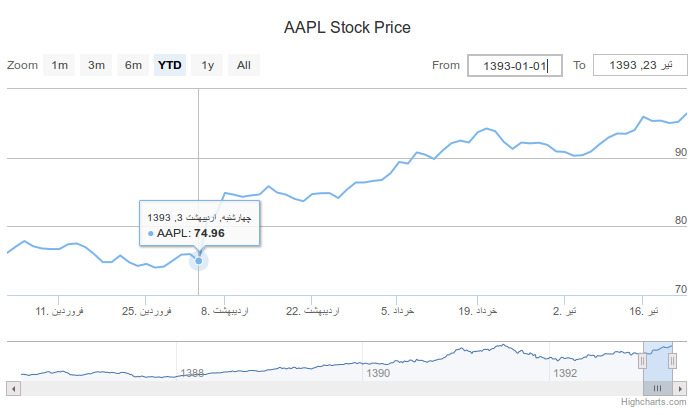Javascript Date class implementation for Jalali calendar
The library contains a JDate class that is implements API of orignal Date class, but operates in Jalali calendar.
>>> j = new JDate
>>> j.toLocaleString()
"1393/04/25 14:51:21"
Underlying date object can be accessed via _date attribute;
>>> d = j._date
>>> d instanceof Date
true
>>> d.toString()
"Wed Jul 16 2014 14:51:21 GMT+0430 (IRDT)"
jdate.min.js is minified version of calendar.js and jdate-class.js.
<script src="jdate.min.js"></script>
Like original Date class, JDate class can be intialized in various ways.
NOTE: unlike Date, JDate cannot be used a function (without new keyword). Original Date class returns the string representation of date, if called as a function.
Initilize to now, if no argument is provided
>>> j = new JDate
Initialize to another Date or JDate instance.
>>> d = new Date(2014, 2, 15)
>>> j = new JDate(d)
>>> j.toLocaleString()
"1392/12/24 00:00:00"
>>> j2 = new JDate(j)
>>> j2.toLocaleString()
"1392/12/24 00:00:00"
Initialize to numeric values
>>> d = new Date(2014, 3, 25)
>>> d.valueOf()
1398367800000
>>> j = new JDate(d.valueOf())
>>> j.toLocaleString()
"1393/02/05 00:00:00"
>>> j.valueOf()
1398367800000
Parse a date string (ISO8601 dates and similar local formats accepted).
>>> new JDate('1392/2/5').toLocaleString()
"1393/02/05 00:00:00"
>>> new JDate('1392').toLocaleString() // Interpreted as ISO8601 UTC date
"1392/01/01 03:30:00"
>>> new JDate('1392-02').toLocaleString() // Interpreted as ISO8601 UTC date
"1392/02/01 04:30:00"
>>> new JDate('1392/02').toLocaleString() // Interpreted as local date
"1392/02/01 00:00:00"
>>> new JDate('1392-02-05 12:31').toLocaleString() // local date
"1392/02/05 12:31:00"
>>> new JDate('1392-02-05T12:31Z').toLocaleString() // ISO8601 UTC date
"1392/02/05 17:01:00"
new JDate('1392-02-05T09:10:01-0230').toLocaleString() // ISO8601 with fixed timezone
"1392/02/05 11:10:01"
Construct with year/month(/day/hour/minute/second/millesecond). NOTE that like Date class, month parameter is 0-based
(0-11), and day is 1-based (1-31).
>>> new JDate(1392, 2).toLocaleString()
"1393/03/01 00:00:00"
>>> new JDate(1392, 2, 3).toLocaleString()
"1393/03/03 00:00:00"
>>> new JDate(1392, 2, 3, 17).toLocaleString()
"1393/03/03 17:00:00"
Like Date class JDate have these class methods: now, UTC, parse
JDate.now returns current time as number, and is exactly same as Date.now (It's return value does not depends on
calendar being used)
JDate.UTC can be used to convert jalali dates (in UTC time) to numeric value:
>>> JDate.UTC(1393, 2, 3, 17, 19)
1400951940000
>>> new JDate('1393-03-03T17:19+0000').getTime()
1400951940000
JDate.parse converts jalali string dates to numeric values and is defined by new JDate(str).getTime()
JDate instances have nearly all methods Date class have.
Time methods inherited from Date class directly (getHours getMilliseconds getMinutes getSeconds getTime getUTCDay getUTCHours getTimezoneOffset getUTCMilliseconds getUTCMinutes getUTCSeconds setHours setMilliseconds setMinutes setSeconds setTime setUTCHours setUTCMilliseconds setUTCMinutes setUTCSeconds toTimeString)
ToString methods except toLocaleString (toDateString toISOString toJSON toString toLocaleDateString toLocaleTimeString toUTCString) is also inherited from Date class and represent Gregorian dates.
>>> j = new JDate(1393, 2, 15, 17, 19)
>>> j.toLocaleString()
"1393/04/15 17:19:00"
>>> j._date.toString()
"Sun Jul 06 2014 17:19:00 GMT+0430 (IRDT)"
>>> j.getFullYear()
1393
>>> j.getMonth()
2
>>> j.getDate()
15
>>> j.setMonth(1)
>>> j.toLocaleString()
"1393/02/15 17:19:00"
>>> j._date.toString()
"Mon May 05 2014 17:19:00 GMT+0430 (IRDT)"
>>> j.setFullYear(1391)
>>> j.toLocaleString()
"1391/02/15 17:19:00"
>>> j._date.toString()
"Fri May 04 2012 17:19:00 GMT+0430 (IRDT)"
This JDate is compatible with original javascript Date class and can bring Jalali calendar support to libraries
without any knowledge of this calendar.
One sample is highcharts (or highstock): Jalali date for highcharts demo
